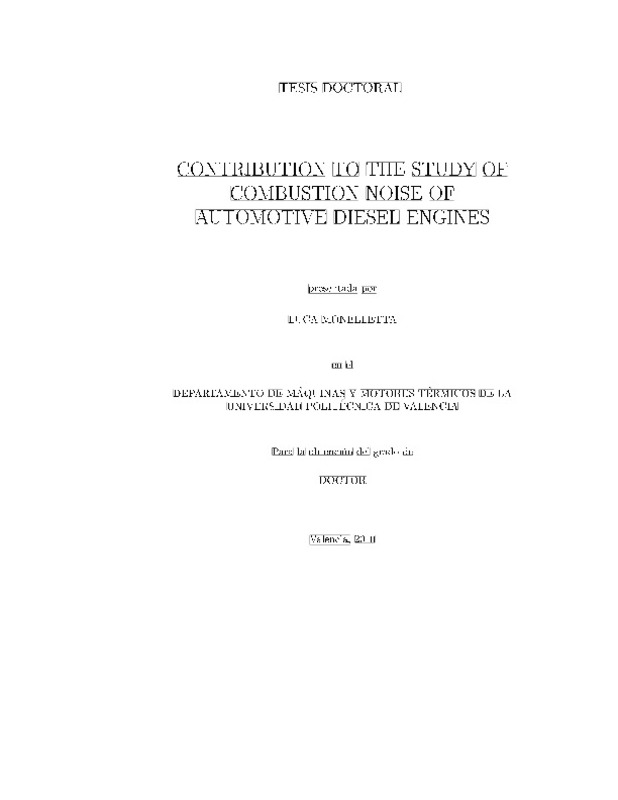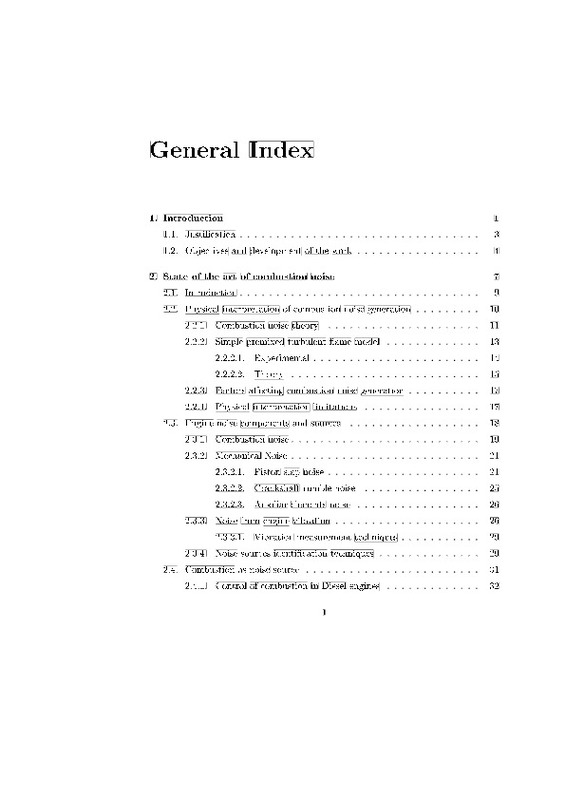- RiuNet repositorio UPV
- :
- Investigación
- :
- Tesis doctorales
- :
- Ver ítem
JavaScript is disabled for your browser. Some features of this site may not work without it.
Buscar en RiuNet
Listar
Mi cuenta
Estadísticas
Ayuda RiuNet
Admin. UPV
Contribution to the study of combustion noise of automotive Diesel engines
Mostrar el registro sencillo del ítem
Ficheros en el ítem
| dc.contributor.advisor | Broatch Jacobi, Jaime Alberto
|
es_ES |
| dc.contributor.author | Monelletta, Luca
|
es_ES |
| dc.date.accessioned | 2011-05-27T12:39:24Z | |
| dc.date.available | 2011-05-27T12:39:24Z | |
| dc.date.created | 2010-07-02T08:00:00Z | es_ES |
| dc.date.issued | 2011-05-27T12:39:14Z | es_ES |
| dc.identifier.uri | http://hdl.handle.net/10251/10954 | |
| dc.description.abstract | Despite their important advantages in terms of fuel consumption in comparison with gasoline engines, for a long time the characteristic impulsive combustion noise has been one of the main causes why customers are reluctant to buy cars equipped with Diesel engines. This is the main reason for the efforts devoted by car manufacturers to mitigate Diesel engine noise while improving performance and driveability. In spite of all technical improvements, vehicles equipped with High Speed Direct Injection (HSDI) engines still offer a comfort level inferior to gasoline engine vehicles. Noise represents one of the most important aspects in the definition of comfort, and especially combustion noise plays an essential role in the acoustic of a vehicle as, in the case of DI engines, it represents one of the most important noise sources. Thus, the great potential of diesel engines for environment preservation -- due to their lower CO2 emissions -- could be missed. This situation worsens with the current design trends (engine downsizing) and the emerging new diesel combustion concepts (Homogeneous Charge Compression Ignition-HCCI, Premixed Charge Compression Ignition-PCCI, etc.) conceived to further reduce NOx and particulate matter to comply with forthcoming legislation, which are intrinsically noisy. Therefore, combustion noise must be considered as an additional essential factor in engine development, together with performance, emissions and driveability. Thus, suitable evaluation procedures that can be integrated into the global engine development process in a timely and cost-effective manner are imperative, both for noise level and sound quality. In this thesis, a procedure, based on the consideration of suitable indicators extracted from in-cylinder pressure, is proposed and validated. Such indicators are obtained from an innovative procedure to decompose in-cylinder pressure signal, so that features associated with combustion and with resonance excitation may be properly identified. | es_ES |
| dc.language | Inglés | es_ES |
| dc.publisher | Universitat Politècnica de València | es_ES |
| dc.rights | Reserva de todos los derechos | es_ES |
| dc.source | Riunet | |
| dc.subject | Combustion | es_ES |
| dc.subject | Noise | es_ES |
| dc.subject | Diesel | es_ES |
| dc.subject | Quality | es_ES |
| dc.subject | Level | es_ES |
| dc.subject.classification | MAQUINAS Y MOTORES TERMICOS | es_ES |
| dc.title | Contribution to the study of combustion noise of automotive Diesel engines | |
| dc.type | Tesis doctoral | es_ES |
| dc.subject.unesco | 331313 - Motores de combustión interna (general) | es_ES |
| dc.identifier.doi | 10.4995/Thesis/10251/10954 | es_ES |
| dc.rights.accessRights | Abierto | es_ES |
| dc.contributor.affiliation | Universitat Politècnica de València. Departamento de Máquinas y Motores Térmicos - Departament de Màquines i Motors Tèrmics | es_ES |
| dc.description.bibliographicCitation | Monelletta, L. (2010). Contribution to the study of combustion noise of automotive Diesel engines [Tesis doctoral]. Universitat Politècnica de València. https://doi.org/10.4995/Thesis/10251/10954 | es_ES |
| dc.description.accrualMethod | Palancia | es_ES |
| dc.type.version | info:eu-repo/semantics/acceptedVersion | es_ES |
| dc.relation.tesis | 3321 | es_ES |
Este ítem aparece en la(s) siguiente(s) colección(ones)
-
Tesis doctorales [5389]







![Text file [Text]](/themes/UPV/images/text.png)


